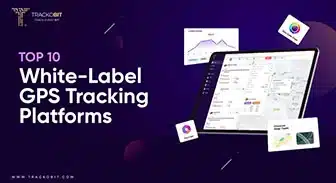-
TrackoBit
Manage commercial vehicles with the new-age Fleet Management Software
TrackoBit -
TrackoField
Streamline your scattered workforce with Field Force Management Software
TrackoField -
Features Resources
-
Blog
Carefully curated articles to update you on industrial trends. -
White Paper
Insightful papers and analysis on essential subject matters. -
Glossary
Explore an alphabetical list of relevant industry terms. -
What’s New
Get TrackoBit & TrackoField monthly updates here. -
Case Study
Explore the cases we solved with our diverse solutions. -
Comparisons
Compare platforms, features, and pricing to find your best fit.
-
About Us
Get to know TrackoBit: our team, ethos, values, and vision. -
Careers
Join the most dynamic cult of coders, creatives and changemakers. -
Tech Support
Learn about our technical support team and services in detail. -
Events
Check out the exhibitions where we left our marks and conquered. -
Contact Us
Connect with us and let us know how we can be of service.
What are the Qualities of a Great Fleet Manager?
- Author:Diksha Bhandari
- Read Time:7 min
- Published:
- Last Update: August 21, 2025
Table of Contents
Toggle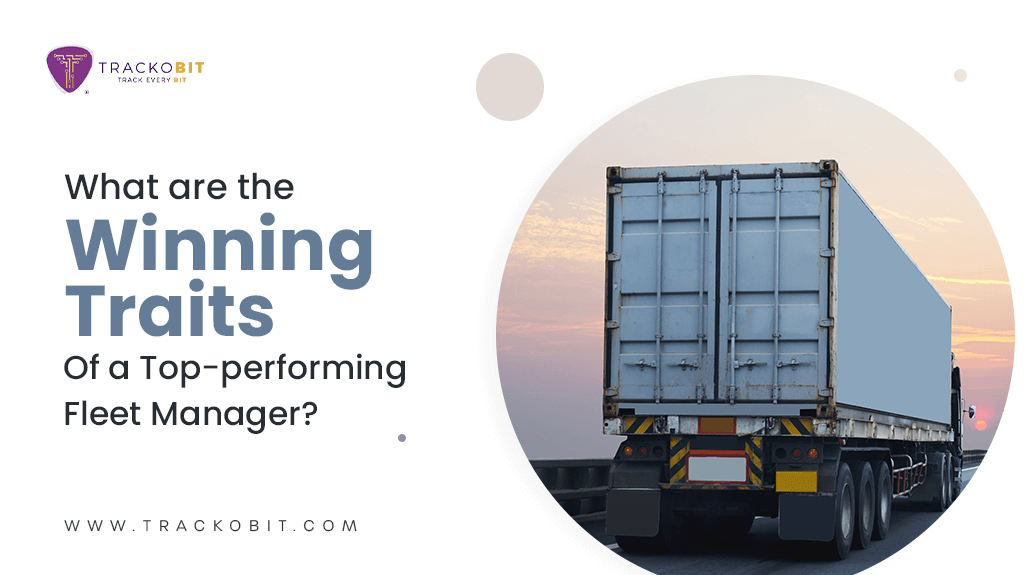
What’s the definition of a great fleet manager? Discover the qualities, skills, and qualifications that would make you a successful fleet manager.
Table of Contents
Toggle
Great Fleet Managers are not born great, they grow great!
Sounds familiar?
Oh yes, you guessed it right! #TheGodfather.
The fleet management industry is not easy to dwell in. It requires an equal amount of mental, physical and psychological effort. However, with time and technology, a lot of stress has been shared by fleet automation tools and vehicle tracking software. Yet, fleet managers have truckloads of roles and responsibilities to take care of.
This entire piece of article is dedicated to unsung heroes of the logistics and transport industry. It will be an interesting and useful read for any seasoned or novice fleet manager.
What is a Fleet Manager? What does a Fleet Manager do?
A fleet manager is in charge of a fleet of vehicles in logistics, freight forwarding or transport sector. He is responsible for managing and coordinating fleet operations including vehicle management, driver management, trip scheduling and a lot more. The bigger the fleet of vehicles the greater the number of fleet managers get in an organisation.
It may sound very simple but fleet operations on the floor get messier and more complicated than what it looks here on the screen. It involves seamless balancing between various stakeholders involved in the business – including consignments, drivers, vehicles, rentals and trip managers.
What are the Primary Roles and Responsibilities of the Best Fleet Manager?
“With Great power comes great responsibility.” Uncle Ben was so right!
The designation and the position of a fleet manager is not a small one, to be clear. It does come with a lot of responsibilities – towards the fleet, towards the organisation, towards drivers and the rest of the staff.
Let’s touch upon them one by one!
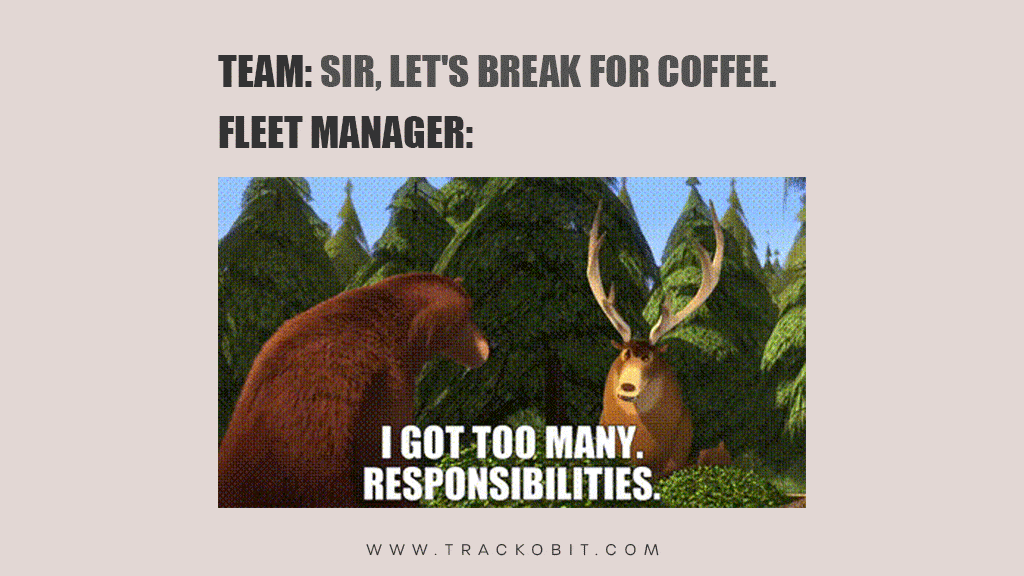
Fleet Maintenance
Managing the entire fleet is one thing and maintaining each and every vehicle to ensure 100% uptime is another. They are responsible for ensuring timely vehicle servicing, maintaining overall fleet health, and renewing permits/licenses before expiration.
Driver Management
Managing drivers involves much more than preparing driver schedules and tallying their leaves. Fleet managers must keenly do the KYC of each driver enrolled on the team. This includes verifying all the necessary licenses they must own in order to work as drivers. Keep tabs on their performances and delegate work according to their abilities.
Drawing Fleet Efficiency
Ensuring that the fleet is operating optimally, without having to pay unnecessary overheads is also a fleet manager’s job. How does this happen? Keeping a close eye on various aspects such as fuel efficiency, driver behaviour monitoring and vehicle uptime allows for cutting inefficiencies. Hence, saves extra costs.
Vehicle Acquisition
Vehicles are the centrepiece of a fleet manager’s work. Vehicle acquisition, disposal and rental operations are some of the primary tasks when you are in charge of a fleet. Some crucial decisions pertaining to vehicle acquisition include when to dispose of or buy a vehicle, which one to keep and which one to sell.
Safety and Compliance
In your endeavours to become the best fleet manager, you must abide by safety and other necessary compliances. Making sure that all the vehicles in the fleet are following safety regulations and complying with industry standards.
Budgeting and Expense Management
Everything comes down to budget, profits, and money in the end, right? Preparing estimates and managing budgets is one of the major responsibilities of a fleet manager. Other financial chores include predicting costs, monitoring expenses and making ad-hoc tweaks in the allocations and generating financial reports.
What are the Qualities of a Successful Fleet Manager?
When a professional starts climbing the career ladder, some manage to climb it a little faster than others. The ladder is somewhat the same, each rung comes with a different challenge for everyone. So what makes a good fleet manager more successful than an average one?
Following are some skills and qualities that a professional must possess or hone over the period to become the best fleet manager.
Time Management Skills
Excellent time management skills do make a difference in every professional’s life. However, in a fleet manager’s career, it plays a little more important role. Trip execution, delivery management, in fact, logistics as a whole is a time-sensitive business, because if one step gets delayed it’ll have a domino effect on the entire supply chain.
Strong Organisational Skills
Managing multiple aspects of a round-the-clock operating business takes some hell of organisational skills to keep running. And the bigger the fleet gets, the stronger your skills need to be.
Technically and Analytically Sound
Managerial skills are just not enough to get into the shoes of a fleet manager. You have to be technically sound to understand and monitor various levels of fleet operations. Solid analytical skills along with technical abilities make a one-bomb combination. Hence, help in decoding fleet metrics and their hidden meaning.
A Multi-tasker
As mentioned earlier, juggling between a hundred tasks is what fleet management is all about. Only a good multi-tasker can make his/her way through tedious fleet chores without going crazy.
Sound Decision Maker
Instant decision-making ability is something that an average human being lacks. It’s a skill that needs to be adopted and honed with time. In this job role, confident and quick decisions are required quite frequently. However, this skill is built on years of experience and knowledge.
Problem-solving Skills
When you sit on a manager’s chair, you ought to be a problem solver because this throne demands that. You never know when and how an issue flies in the operations and from where. Therefore, you have to be prepared at all times.
Adaptive to Change
A business can’t thrive if the core team and the people in charge are not ready to grow, learn, and unlearn. Be it in terms of new geographies and markets, the introduction of new technology such as telematics software or adopting a new approach – change is a must for scalability.
How to Become a Successful Fleet Manager?
The recipe to becoming a successful fleet manager is easy. I have already shared all the necessary ingredients with you above. All you have to do is incorporate these skills in the right amount and hone them with time and experience.
If you are a beginner in the field of fleet management and starting in the executive role, that’s great, you can try imbibing these qualities right from the beginning. Other than garnering the skills, a few more tips would include:
- Getting relevant and necessary education and certifications
- Gain hands-on industry experience and never shy away from working hard.
- Stay up to date with the industry trends
- Build a strong network of industry and non-industry people
- Embrace technological advancements and be early adopters of relevant tools
- Never take matters pertaining to safety and compliance lightly.
What Challenges Do Fleet Managers Face Today?
Every industry and every job comes with its share of challenges. So does fleet management. Without beating around the bush let’s come straight to the point, following are the frictions or problems that fleet managers face on a regular basis.
Rising Fuel Costs
Forget about a fleet manager, rising fuel costs are a universal concern across domains. Anyway, fleet managers have to fight a little harder to keep themselves afloat.
Compliance with Regulations
Compliance with industry regulations and guidelines can be taxing and time-consuming. Staying current with new additions and frequent changes/upgrades ensures that fleet operations are in compliance.
Vehicle Health and Maintenance
When vehicles are running on the road for hours and days continuously, one trip after another, the probability of wear and tear rises manifolds. With bigger fleets, this becomes all the more challenging.
Driver and Vehicle Shortage
The industry has a dearth of good drivers, but a shortage of vehicles during peak seasons is another boulder that fleet managers have to face along the way. Coordinating with vehicle suppliers and managing rented vehicles is an added responsibility.
Fast Growing Technologies
In this time and age, no industrial sector is untouched by technology and automation. Keeping up with the fast-paced technological advancements is another challenge, especially for those who are not technologically sound.
Data Management
The increasing amount of data collected on fleet operations can be overwhelming. Maintaining reports and records on each vehicle, driver, and asset for the future is another battle.
Environmental Concerns
No doubt, the transport and fleet sector is a significant contributor to pollution globally. The stress on managers to optimise fleet operations and reduce carbon footprints is only increasing with time.
The Conclusion
In a nutshell, a fleet manager’s role is complex and multifaceted which involves coordination with multiple stakeholders. Other than adopting a few added skills, a good fleet manager must keep up with the industry and technological trends. Considering the wide use of telematics and fleet management software in the logistics and transportation sector, familiarity with fleet monitoring platforms is a must.
While AI and automation tools have simplified fleet operations management, they have also set the course for data-driven fleet management. Therefore, possessing analytical skills is a must for any fleet manager. By taking a proactive and strategic approach to fleet management you can drive your organisation towards growth and scalability.
Diksha Bhandari is the Content Marketing Manager at TrackoBit. With over a decade of experience in the media and advertising industry, she has transitioned her expertise to the world of software and t... Read More
Related Blogs
-
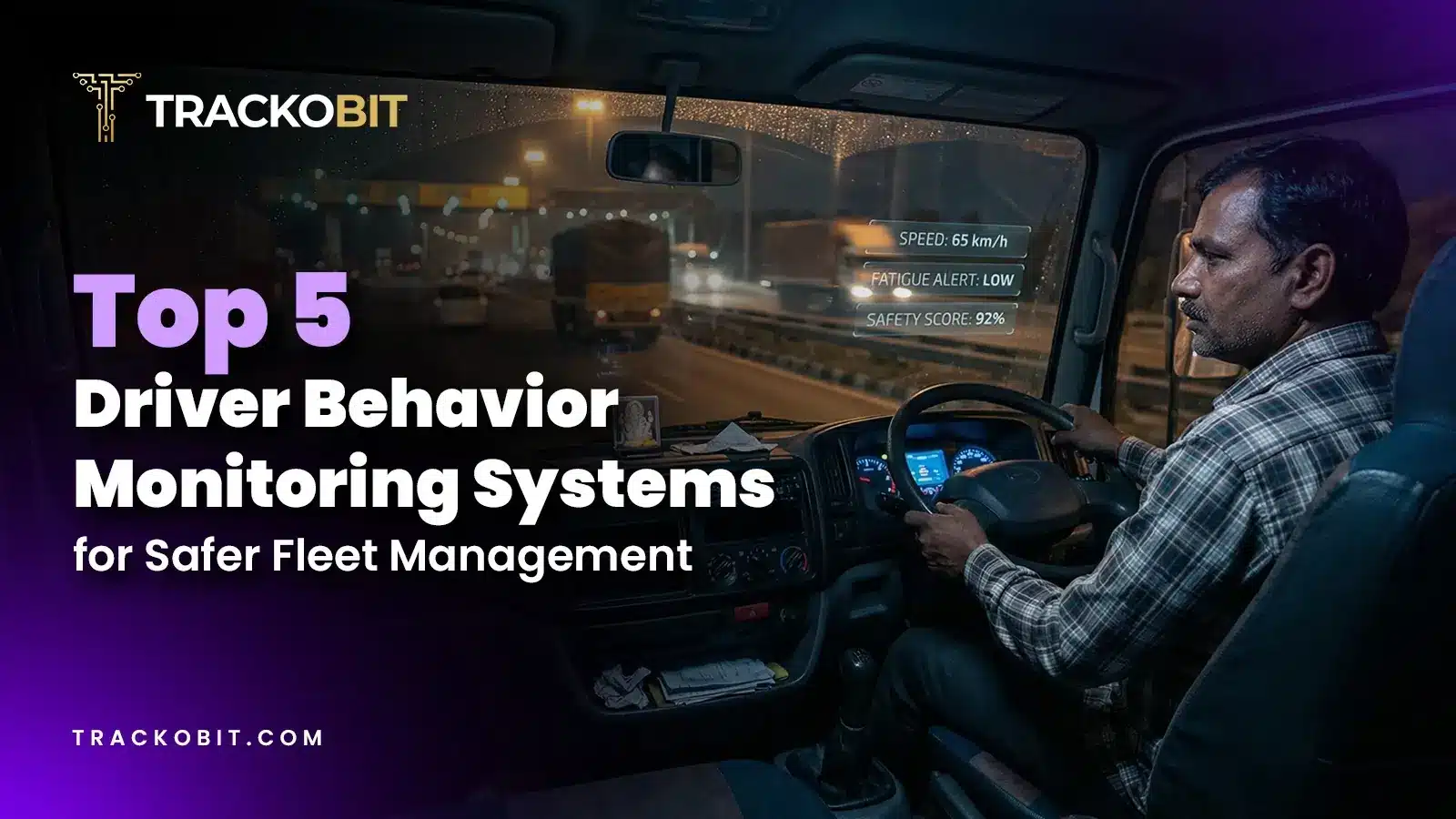
5 Best Driver Behavior Monitoring Systems for 2026
Tithi Agarwal February 23, 2026Having the best driver behavior monitoring system is a necessity as it helps you ensure driver safety and optimize operational…
-
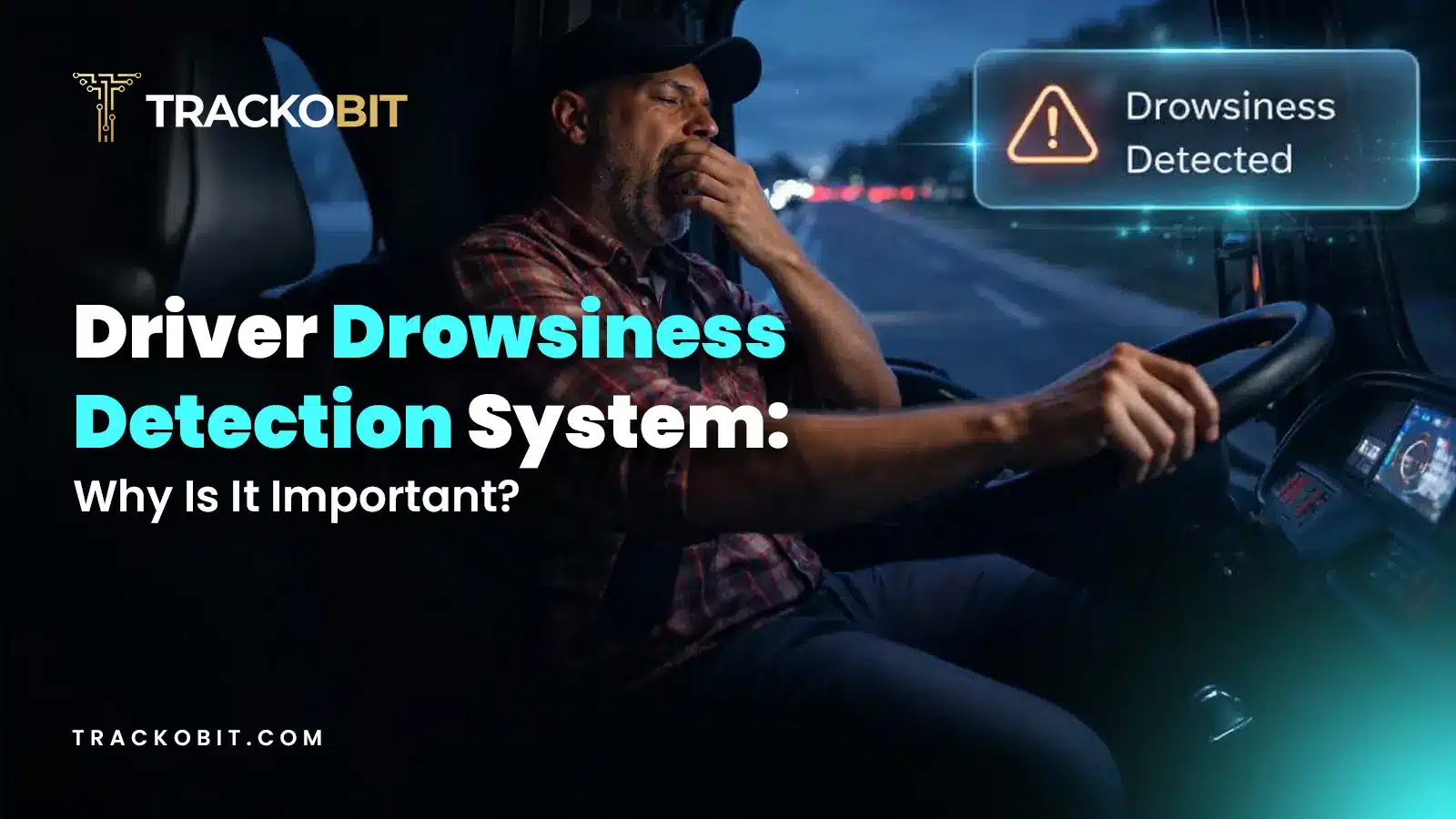
Why is Driver Drowsiness Detection System Important for Fleet Management?
Shemanti Ghosh February 4, 2026A driver drowsiness detection system is critical for fleet management. It helps prevent fatigue-related accidents and reduces operational risks through…
-
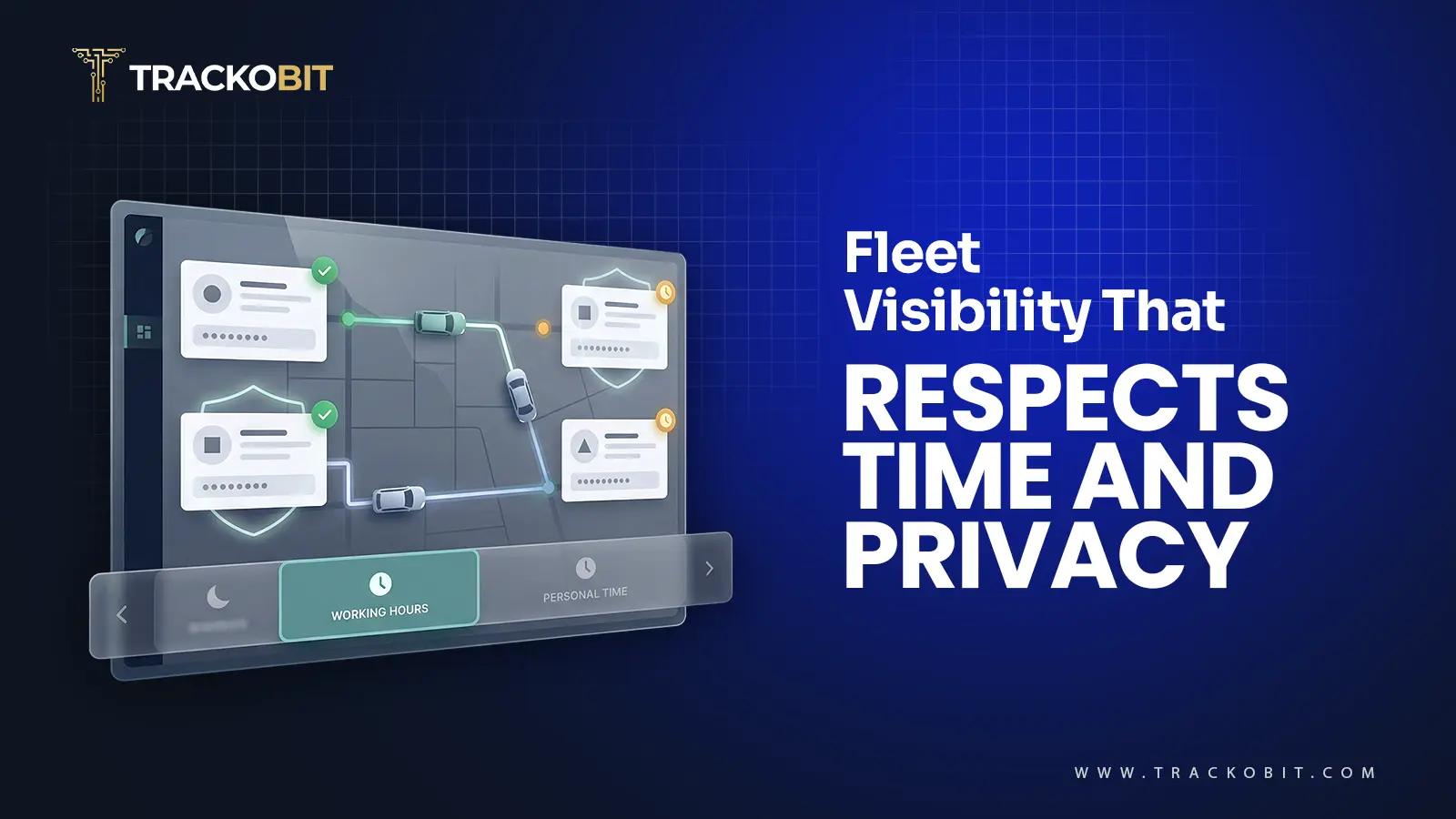
When Tracking Needs a Clock: Rethinking Fleet Visibility
Tithi Agarwal December 24, 2025Read on to understand why fleet tracking works better when it follows working hours. Because visibility should support operations, not…
-

What Makes TrackoBit’s Video Telematics Software Truly Next-Gen?
Shemanti Ghosh December 17, 2025TrackoBit’s video telematics software blends smart video intelligence with full server control. The result? Superior fleet reliability and safety.

Subscribe for weekly tips to optimize your fleet’s potential!
Your inbox awaits a welcome email. Stay tuned for the latest blog updates & expert insights.
"While you're here, dive into some more reads or grab quick bites from our social platforms!"Stay Updated on tech, telematics and mobility. Don't miss out on the latest in the industry.
We use cookies to enhance and personalize your browsing experience. By continuing to use our website, you agree to our Privacy Policy.



































